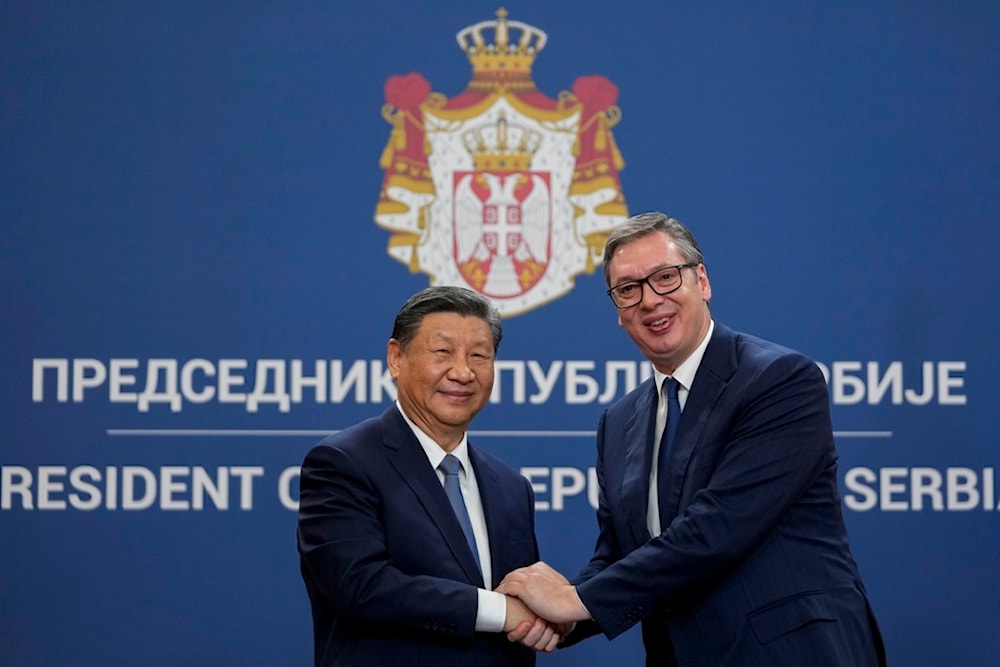Serbia welcomes Chinese President Xi Jinping with 'respect, love'
Last year's signing of a free trade agreement between Beijing and Belgrade greatly contributed to solidifying their economic partnership.
-

Chinese President Xi Jinping shakes hands with Serbian President Aleksandar Vucic at the Serbia Palace in Belgrade, Serbia, Wednesday, May 8, 2024. (AP Photo/Darko Vojinovic)
Serbia extended a warm welcome to Chinese President Xi Jinping on Wednesday following the Chinese leader's visit to France.
China's substantial investments in Serbia and neighboring Balkan countries, particularly in sectors like mining and manufacturing, have played a significant role in deepening economic cooperation.
Last year's signing of a free trade agreement between Beijing and Belgrade further solidified their economic partnership.
Xi is a "friend of Serbia," Serbian President Aleksandar Vucic said as he welcomed Xi and his wife on a red carpet outside the main government offices in Belgrade.
"Such respect and love as he will find here in our Serbia, he will not find anywhere else," Vucic added.
Speaking in defiance of the West's agenda, he noted: "We have a clear and simple position regarding Chinese territorial integrity. Yes, Taiwan is China."
Read more: Serbia pays high price for not sanctioning Russia: Vucic
In his opening remarks, Xi conveyed to Vucic that there was a "strong feeling of friendship between our two countries".
"I hope that this visit will meet your expectations and show the contribution that China can make to Serbia," he said.
Later, they made a joint appearance to formalize their commitment through the signing of a joint declaration, which encompassed various commercial pledges such as procuring new Chinese trains, establishing new air links, and augmenting Serbian imports.
Memories of US aggression
Xi's visit coincided with the 25th anniversary of the tragic event in 1999 when the US bombed the Chinese embassy in Belgrade, resulting in the loss of three lives.
"Do not forget that our Chinese friends were with us 25 years ago when this country was being demolished and bombed," Vucic told crowds Wednesday.
The embassy was hit during a months-long NATO campaign led by the US, which aimed to target Serbian security forces engaged in conflict with ethnic-Albanian insurgents in Kosovo.
Following the incident, the US issued an apology, attributing the bombing to outdated maps that led the pilot to mistakenly target the embassy.
Read more: Remembering NATO's monstruous bombing of Yugoslavia: 24th anniversary
On Tuesday, Xi conveyed in an op-ed published in the Serbian daily Politika that NATO's bombing of the Chinese embassy constituted a blatant act, cautioning that China would not tolerate a repetition of such tragic history.
Serbia has consistently aligned itself with China's stance on Taiwan, and reciprocally, Beijing has extended steadfast support to Serbia's territorial assertions concerning the breakaway province of Kosovo.
In collaboration with Russia, China has effectively blocked Kosovo's recognition within the United Nations.
Xi stressed the necessity for both nations to steadfastly uphold each other's core interests and maintain bonds of solidarity.
"China supports Serbia in upholding its policy of acting independently ... (and) its efforts to safeguard national sovereignty and territorial integrity on the Kosovo issue," he said Wednesday.
Read more: Xi Jinping on a European tour amid EU trade dispute
NATO waged brutal aggression in the former Yugoslavia in 1999 for 78 days, which led to the disincorporation of the former republic and killed between 3,500-4,000, and injured some 10,000 others, two-thirds of which were civilians. The alliance's aggression cost Belgrade around $100 billion in material damages.
Over the period of the aggression, the alliance dropped an estimated 15 tonnes of depleted uranium in bombs and shells, after which the country's cancer rates spiked, ranking it the first in terms of cancer in Europe. In the first ten years following the heavy shelling, about 30,000 developed cancer, and estimations say that between 10,000-18,000 of them died.

 4 Min Read
4 Min Read








